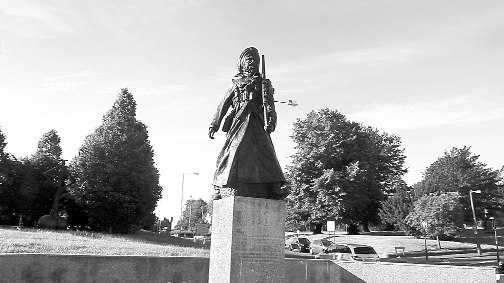The Sikhs of Smethwick & their fightback
Rohit Mahajan
The Sikh soldier in the statue, rifle in his left hand, chest thrust forward, strides on. It’s only a statue, but it’s a significant marker in time and space and psyche of Smethwick, Birmingham.
The memorial is called the Lions of the Great War — it’s a tribute to the Sikhs of Punjab who fought in the defence of the UK, and the ‘free world’, in the First World War 100 years ago. Much changes in 100 years. A century ago, the Sikhs fought for Great Britain, in Europe and Africa and Asia; 60 years ago, they fought for their rights, right at Smethwick.
Boom in the auto industry in the Midlands led to labour shortage; that shortage was filled by immigrants from the Commonwealth countries. They were confronted by horrid racism — they just didn’t know how to deal with it; they didn’t know enough English to read signs that said ‘No Dogs, No Asians’. They were paid lesser than the British; on payday, the thugs among the British workers extorted a portion of their salaries — a ‘tax’ from immigrants, taken with threats of violence.
Standing up for rights
Daljit Singh Shergill had migrated to the UK in 1962. He got work in a factory, and he was among the immigrants who had to pay up to the thugs. Then, one Friday, he decided enough was enough — he didn’t part with his hard-earned money. The dispute led to a clash. Shergill thought he was going to get into trouble — after, he was an outsider, wasn't he? But no, he was promoted. The authorities respected the fact that Shergill had the courage to stand for what was right.
Shergill’s daughter, Preet Kaur Gill, is now a Labour MP — the first Sikh woman MP in Britain. Just 50 years ago, this would have been impossible. Relations and politics then were poisoned by bigotry and racism.
The parliamentary election for Smethwick in 1964 is considered the ugliest, most horrible in the electoral history of Britain. Race relations were at their worst. Conservative politicians were allegedly trying to win votes with the slogan: “If you want a nigger for a neighbour, vote Liberal or Labour.”
Marshall Street
Many whites of Smethwick didn't want a ‘nigger’ for neighbour.
A mile away from the Lions of the Great War memorial lies Marshall Street, which could well have become the first official apartheid residential location of the UK. During the 1964 election, white residents persuaded the local council — led by the Conservative Party — to buy the houses on Marshall Street and rent them out to only whites. That such a plan was hatched is a sign of the times when central and northern Britain was coming to terms with mass immigration; that it was approved by elected representatives seems quite scandalous now. But England had elected a Labour Party government that year; Richard Crossman, the Housing Minister, did not let the plan to go through.
Marshall Street now houses people of all hues and beliefs — you walk through it and you read names such as Singh, Khan, Malik, Chaudhary, apart from ‘English’ names. Indeed, according to the 2011 census, 62.1 per cent of Smethwick's population comprised minority ethnic groups who don’t identify themselves as white British; 39.6 per cent of the population was Christian, 15.3 per cent Sikh, 21.3 per cent Muslim and 2.4 per cent Hindu. Smethwick is now a sharp rebuke to the anti-immigrant bigotry of the Conservative politicians of the 1960s who openly supported segregation and racial apartheid; conversely, Smethwick's immigrants have brought the baggage of their religion-based and ethnicity-based biases and hatreds to the town.
Heavy metal
One hundred years ago, Indians were struggling to free themselves of British colonialism. They were fighting and giving up their lives for the cause of Independence. The British, however, were controlling the ‘mutinous’ Indians by using armed forces, largely comprised of Indian mercenary soldiers. These were also the men who fought for the British ‘values’ and ‘freedom’, across Africa to Asia to Europe.
For the residents of Smethwick, Birmingham, that's long past; the statue of the Sikh soldier, standing next to Smethwick’s Guru Nanak Gurdwara and inaugurated on a cold November day in 2018, is cast in bronze. For the older residents of the area, immigrants from all over the Commonwealth, it is a living example of the impermanence of hatred and biases.









